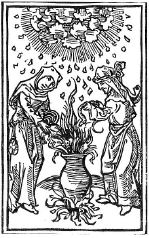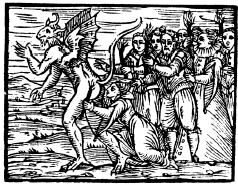Chapter VIII
In which young Orpí wanders through the woods, finds a clutch of horny witches, and goes to hell
The uncertainty of the road ahead, when one has no concrete destination in sight, stretches the minutes into hours and tribulations into eternal torment. And as this story of young Orpí lost in the wood is ever so sui generis, we shall tell it in the following manner. During those next few days our hero slept hidden amid the brush. Sometimes he took the advice of the vicar-highwayman and stole the occasional hen from a farm before slipping back into the wood, but generally he was hungry, cold, and altogether melancholy. One night as our hero walked chip-chop-chip through the overgrown sward, he heard rustling noises beside a river. As he approached a clearing beswirled in fog, he discovered ten naked women dancing around a bonfire: pastoral devil worshippers celebrating a black mass.
The assembled women—most of them old, poor, and soft in the head—were smearing unguents all over their faces, anuses, and pustulous vaginas, as they kissed each other lasciviously, and sang out in Frog:  J’adore, Monsieur Lucifer
J’adore, Monsieur Lucifer 
Young Orpí, singularly innocent, went over to them in search of aid.
“Good even, ladies. Ye wouldn’t happen to haveth a bit of bread fer a hungerly soul? As mine luck would hath it, dread highwaymen pilfred mine coin & steed and anon I nar starving right to deathe.”

Seeing him, the witches took him for the sabbatic goat they’d been invoking since dusk with their black magic and, without hesitation, they pounced on him like a herd of ravenous wolves, ripping off his clothes and preparing to rape him. One sucked on his nipple, another stuck a rough tongue in his mouth, yet another tore his underwear, and there was even one who drank the blood of a dead rabbit while smearing it all over herself. As they raped him, the sodomitic enchantresses made our hero drink a potation containing old women’s molars, thornapple, belladonna, fly agaric, cascall, old hen schmaltz, and arsenic. Those herbs, rich in an alkaloid called atropine, acted quickly on the nervous system of our young hero who suddenly saw a crater in the earth open before him, as the sky darkened with shadows. Poor Orpí fell into a very pungent, sticky place. Everything stank of roasted flesh and all that was heard were souls shrieking in eternal pain, brought about by a perpetual flame that burnt their impious asses. One of the many souls there, by the name of Pere Portes,16 approached our hero and spoke to him.
“Milord, I seeth that thou art a newcomer to the Kingdom of Hell.”
“Helle? Holy Mother of the Vyrgin of Seven Sorrowes! I reckont I war somewhitherelse!” exclaimed young Orpí.
“Ssshh! You can’t invoke saints & virgins down hither! And as fore thy location, in his Aeneid, Virgil placeth it in the Sybil’s cave. The Orlando Furioso sayeth it be beside the source of the Nile. Others doth claime its entrance be at Bouchet Lake, in Auvergne, or Lake Avernus, or at the Gole dell’Infernaccio in Italy. Others ween it in the Alt Urgell, in the town of Segur and the Baix Empordà or the Torrent de l’Infern in Tavèrnoles, just ta nameth some local places; Mount Etna be a hellmouth, too. I could verily bee hither alle the day long listething names till blood cometh out mine nose.”
“Thank ye for thee unnecessary inf’rmation,” said Orpí. “I caint reckon iff I done kicked the bucket or wut, but I doth not like this lodging in the slightest. And it’s too muggy.”
“Exactly, exactly! I totally concurr. Methinks they shouldst pop the doores (wherever they be), and aire this place out. Helle is verily an academy of heat.”
As the two men walked amid the fires and scorched souls, they greeted Gilgamesh, Seth, Odysseus, Hermes Psychopompos, Virgil in Hell, and a bunch more illustrious figures, all surrounded—poor things—by flies, excrement, and flames. Then, continuing along on their infernal Grand Tour, Pere Portes showed Orpí some rooms equipped with all of the latest generation of torture instruments and filled with souls shrieking in perpetual suffering. Then Satan himself materialized before the two men. He was a hideously ugly being, all reddish and covered in spikes, accompanied by an entourage of incubuses and succubi.

“Verily well, I see we hast a new guest at our hallowe home!”
“Thou art mistaken,” said Orpí. “For I’m not meant to beest here.”
“That’s what they all say!” bellowed the Devil. “Thou dost not repent thine sins, henstealer? For if ye plan on accreting up worldly riches & accolades, then this hither shall surely bee yern final stoppe.”
“How canst I repent, when I’ve committ’d no sinne?” responded Orpí. “And seeing ath I be in charge of mine own selfsame, therewithal I’ll beest leaving on mine own two feet withoute running it by anyone.”
“Aha, crappy peasant, bethinks thee escape soe easy?” roared the Beast. “I’ll lash thee so harde thou shallt ne’er feeleth thine posterior again, and then thou shalt knowe who’s in charge of thine own selfsame.”
Just as the Prince of Darkness was about to stick his pitchfork into him from behind, young Orpí ducked out of the way and, with a quick goodbye to ole Pere Portes, he slipped like a hare through the tortured souls. The Devil was close on his trail until, there in the distance, Orpí saw a light and the light turned out to be the mouth of a cave, a yawning mouth amid the rocks. And through it, our hero managed to escape certain eternal damnation amidst the fires of hell.
___________
16. A famous character in Catalan literature, from the anonymous work The Strange Case of a Man Named Pere Portes, from the Town of Tordera, Who Entered and Exited Hell, written in the year 1611.